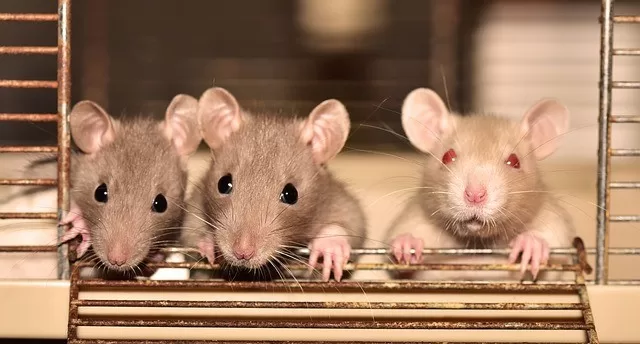Rats and mice spread various diseases globally. The illnesses can be spread to humans directly via the handling of rats, contact with their feces, saliva, urine, or rodent bites. Rats may also carry mites, fleas, or ticks that can serve as vectors to spread illnesses between humans and rodents.

Hantavirus pulmonary syndrome, rat-bite fever, leptospirosis, and salmonellosis are illnesses directly transmitted by rats.
They may also transmit diseases indirectly, including plague, cutaneous leishmaniasis, and Colorado tick fever. Rat exposure can also impact your mental health. Here’s how to keep rats out and away from your house.
1. Invest In Rodent Control Services
Rats and mice can be destructive. They contaminate food, spread illnesses, and destroy property. Professional rodent control services are the most effective step for controlling rodents.
Considering how dangerous handling rats can be, it’s best to leave them to experts because they have the necessary training, skills, experience, tools, and techniques to inspect your house, identify rat entry points, locate their hideouts, and find ways to keep them off your property without damaging it.
Professionals can also help determine the primary infestation causes and ensure rats don’t come back in the future. With a rodent control service, the affected areas in your home can be exterminated and decontaminated.
2. Rodent-Proof Your Home
Rodent-proofing is an excellent way to keep rats out and away from your home. It’s an eco-friendly method as it prevents the use of pesticides and other chemicals by ensuring infestations don’t occur. Using the right materials is essential to successfully keep rats out of your house because these rodents can chew through plastic, wood, and some sealant types.
However, woven wire mesh, hemp, and mouse-proofing silicone sealant are materials they can’t penetrate. Upon proper installation, rodent-proofing solutions leave no room for rats to pass through. This helps prevent rat-related health risks, expensive and time-consuming infestation interventions, property damage, and more.
Read Also:
3. Inspect Your Home
If you suspect rodents in your house, a thorough home inspection can help confirm whether you have a rat infestation problem. During the examination, wear sterile gloves for maximum protection.
Look for signs of urine stains, fecal pellets, footprints, and tail drag tracks, unidentifiable odors, and gnawing damage on furniture corners, studs, door corners, and window and door flashing.
Find out where the rats enter your house by looking for runways and burrows. You can find rat runways around dense vegetation. When looking indoors, walls will be your guiding points.
Common rat burrow points may be found beneath debris and shrubbery, brush and wood piles, trees, and vines along your house’s foundation and walls. Look for outdoor rat nests, which you may find in tree cavities, vegetation, under your garage foundation, clutter, and rock caverns.
Walls, attics, lofts, drawers, cabinet voids, fridge motor components, garage clutter, and false ceilings are possible indoor rat nesting points you should check. If you find evidence of rat infestation, you control them or hire a professional rodent-controlling service.
4. Set Traps
A trap eliminates rats from your house and is safer than chemicals. After a thorough home inspection, you’ll know where the rats are to place your traps. Set your traps along paths that the rats often travel and against walls in secluded places where they seek shelter.
When setting your trap, ensure the bait is attractive to rats. You can use unshelled nuts, dried fruits, peanut butter, or pet food, and ensure the bait is attached so that the rat can’t remove it before setting the trigger. Consider attaching the bait using a fine wire or thread to tie it or glue it.
5. Seal Holes and Gaps Inside and Outside Your House
Sealing your home can help keep rats out. You can use steel wool to fill the small holes and gaps, then caulk around it, or use spray foam to ensure the steel wool remains in place.
You can use lath metal or lath screen, hardware cloth, metal sheeting, or cement when fixing larger gaps and holes. Seal trailer skirting gaps and apply to flash around your house’s base. You should seal the garage and outbuildings to keep rodents away from your property.
6. Keep Your Food and Water Covered
Rats enter your home to look for food and water. Leaving these two exposed makes your house a target for rat infestation.
To prevent this issue, store your food sealed in metal, glass, or plastic containers with tight lids, keep pet food safe after use, avoid leaving water and food bowls out overnight, clean food spills immediately, and ensure your dishes are cleaned after each use.
You should also keep indoor garbage in metal or plastic containers with tight lids and dispose of it regularly. Clean the containers frequently with soap and water.
7. Eliminate Nesting Spots
Trimming, cleaning, and keeping your garden clutter-free can help discourage rats from setting nesting spots in your compound.
Ensure proper lawn maintenance and eliminate wood, old appliances, cardboard boxes, leaf piles, or other things like deep mulch, discarded automobiles, and old furniture that may shelter the rats.
Spaces in gas lines, sewer lines, and plumbing lines can create good nesting points for rats. Close these gaps to reduce the risk of rat infestation. If you have firewood piles, consider keeping them far away from your house and ensure they can’t access them from the ground.
8. Keep The House Clean
Rats are usually attracted to unhygienic areas. And while you can still find them in a clean house, sticking to a regular house deep cleaning routine can help eliminate anything that may attract them to your home.
You’re likely to find food cramps on floors, which can be enough to attract rats. Keeping your house perfectly clean can successfully keep rats away.
9. Use Rodenticides
Rodenticides are a quick and simple rodent control solution. They’re easy to use and cost-effective. Rodenticides are meant to kill, meaning you’ll eliminate a rat infestation in no time. Since these chemicals are poisonous, they’re harmful to human health, and as such, they should be kept safely or discarded after use.
Endnote
While rats are unsightly, they’re also a threat to human health. Use these tips to keep rats out and away from your house.









